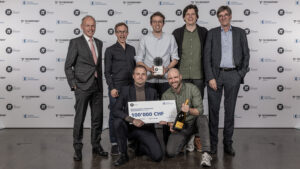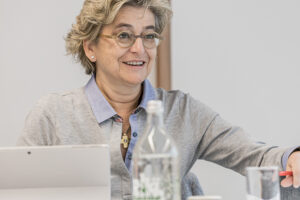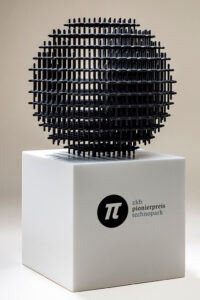Zurich, June 1, 2023 – Yesterday evening, at a festive award ceremony at Technopark Zurich attended by around 300 guests, Synthara AG from Zug was awarded the ZKB Pionierpreis Technopark 2023. Founded in 2020 by Manu V Nair and Alessandro Aimar, the University of Zurich spin-off is developing novel computer chips in which the computing power is embedded in the memory. This results in a 50-fold increase in computing power and efficiency, enabling device manufacturers to create far more complicated models and incorporate more advanced features into products than previously imaginable.
The founders and their team accepted the CHF 100,000 check from the hands of Dr. Jörg Müller-Ganz, Chairman of the Bank Council of Zürcher Kantonalbank, the award’s sponsor. In his laudatory speech, Dr. Lothar Thiele, President of the Foundation Technopark Zurich, emphasized the high number and good quality of the submissions this year. There had been 46 start-ups from all over Switzerland applying for the award. “The many young companies and the originality and quality of the business ideas testify to the innovative power that exists in Switzerland today,” Müller-Ganz confirmed. After the welcome by National Councilor Judith Bellaiche, Tanya König (SRF, TEDx) led through the evening. In a keynote speech, physicist Heino Falcke reported on how he was able to motivate experts around the globe to contribute to the creation of the first photo of a black hole.
The eight-member jury was particularly impressed by Synthara’s combination of social relevance and creative idea. The close connection between processor and memory, modeled on the biological brain, opens up entirely new perspectives for resource-saving information technology and helps to shape and control the rapid developments in the field of artificial intelligence, they said. The technology has the potential to improve efficiency and computing power in many devices, including wearables, smartphones, smartwatches, server farms, autonomous vehicles, drones, and cellular stations. Chip samples with the innovative design will be available in a few weeks. Manu V Nair, CEO and co-founder of Synthara, says, “We want people to follow us and understand what we are doing, why we are doing it and why it is so important and valuable. Winning the ZKB Pionierpreis Technopark gives us an excellent platform to bring this message to the world.”
Further prizes for AgroSustain and MUVON Therapeutics
Also receiving awards – CHF 10,000 each – were the two co-finalists AgroSustain and MUVON Therapeutics. AgroSustain, based in Renens (VD), is a spin-off of the University of Lausanne founded in 2018 by plant biologist Olga Dubey and evolutionary biologist Sylvain Dubey. Together with their team, they have developed a coating that keeps fruits and vegetables fresh longer after harvest. The coating forms a thin physical barrier that keeps out germs while regulating the water content of the produce, leaving it in a state of dormancy, so to speak. This extends the shelf life of bananas by four to five days, for example.
At Zurich-based MUVON Therapeutics, co-founder Deana Mohr and her team have developed a muscle tissue regeneration therapy for skeletal muscles based on more than eleven years of research. The procedure, which is now being tested in a Phase 2 trial in patients with stress urinary incontinence, emerged from a HORIZON research project and is now based at the Wyss Zurich Translational Center. In a personalized medicine procedure, muscle tissue the size of half a sugar cube is taken from the calf of patients. These cells multiply in bio-incubators so that after about four weeks they can be specifically injected into the bladder sphincter. In the USA and Europe, an estimated 200,000 patients with this indication are severely restricted in their daily activities and social contacts. For them, there is justified hope for a cure in the not-too-distant future.


